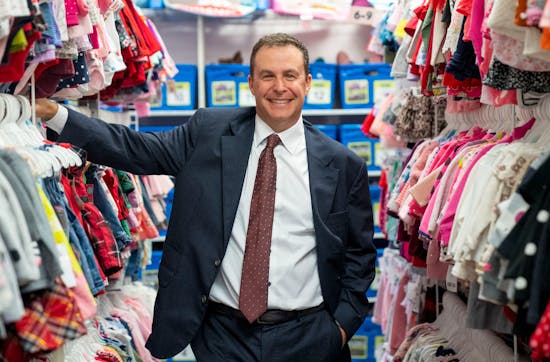Higher interest rates and consumer prices have many retailers worried.
But Winmark Corp.'s resale franchises, including Plato's Closet and Once Upon A Child, are seeing more interest because of them, said Brett Heffes, the Plymouth company's chief executive.
Under Heffes, the company has put a renewed focus on its franchising operations, and the momentum seen this spring could lead to more franchisees, he said.
Since March 2020, when Heffes became chair as well as CEO, he has led the company in exiting some of its other operations from equipment leasing to franchise consulting to concentrate on the retail operations.
The company as a result has rebranded the parent company as "Winmark, the resale company" to focus on sustainability, Heffes said.
At the company's core now are the stores, which sell gently used items: Once Upon a Child (children's clothes), Plato's Closet (apparel aimed at teens and young adults), Style Encore (women's clothing), Music Go Round (instruments and music gear) and Play It Again Sports (sporting goods).
Like other smaller retailers, Winmark's stores were affected by the pandemic, but they rebounded last year and have gained momentum this year, Heffes said. Royalties and fees from the franchises led to annual revenue in 2021 of $78.2 million. Sales across the franchise stores were $1.4 billion, up 31% over 2020, which was affected by pandemic restrictions. The sales were up 17% from 2019.
As a result, net income was up 39% to $39.9 million over 2020 and 24% over 2019.
Consumers have long appreciated the franchising company's concepts for helping them save money. And dips in the economy have generally been a spark for new business creation, including people looking to be their own boss by buying a franchise business.
"When inflation goes crazy, this category gets busy because people want to save money," said John Francis, a Mendota Heights-based franchising industry adviser and executive coach known as "Johnny Franchise."
Francis has consulted with other resale franchises including Just Between Friends. The company, which started in Tulsa, Okla., franchises its pop-up consignment sales concept across the country.
The pop-up idea dried up at the start of COVID-19, but the sales are now back, he said. "Their business is up significantly this year."
Local thrift stores also are seeing increased traffic this year from shoppers looking for value, managers said.
"Inflation has played a part in increasing the traffic that we've had at our stores," said Jill Carmody, senior manager for Twin Cities Habitat for Humanity's two ReStore home improvement concepts. "I've had a few shoppers say, 'You guys are the only place left I can afford anything.' "
But Ed Koerner — executive director of the Society of St. Vincent de Paul Twin Cities, which operates thrift stores in St. Paul and Minneapolis — says high inflation has been a "double-edged sword." While traffic and sales were up in the first half of 2022, people are holding on to items longer and the organization's costs are up.
"We don't get the same quality of stuff dropped off at the back door," he said. People are buying less as well.
Winmark has 1,276 franchise operations open under its five concepts and 48 franchises that have been awarded but not yet open. With 2,800 available territories, Heffes said there is plenty of room to add additional locations.
Francis knows of other franchised resale concepts that are also doing well and are benefiting from the current economic situation.
Winmark was smart, he said, to wind down the noncore businesses.
"I think that's a smart strategy," Francis said. "Concentrate on what you are good at. ... It's good for the franchisees."
Winmark's leasing business provided 22% of revenue in 2020 but only 14.2% in 2021.
Through a quirk in its licensing and franchising agreements, Winmark Corp. has recently added 11 Play It Again Sports stores to its franchise network. A sales agreement with a former license holder also gives Winmark the ability to develop more of the stores in Minnesota and in Sioux Falls — a hot market for many of its concepts.
Over the last 20 years Heffes has been with the company, Winmark has been a slow but dependably growing company. Until recently, its stock was a consistent performer.
"We believe that the resale company is just a more accurate description of who we are, what our purpose is, and that it provides a heck of a lot more clarity to franchisees, to potential franchisees and to investors," said Heffes, who took over as CEO in 2016.
Where there used to be some social stigma around used clothing and gear, Heffes said that stigma has been fading as a new generation of consumers have grown up with eBay and the "Reduce, Reuse, Recycle" mantra, and sustainability has become a major principal for companies to hang their reputation on.
Sustainability has always been core to the resale business model but now Winmark is embracing it fully.
The 85 headquarters workers regularly take the pulse of their franchisees, gaining feedback on what works from promotions to hiring practices and e-commerce. They then share the practices across the franchisee network.
"We try to execute the ideas that we see in the field that impact the most number of people," Heffes said.




